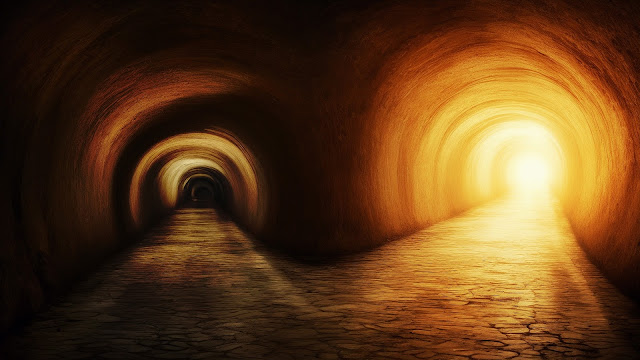Preface
''I've been wanting to write this article for quite a while now. My grandfather, who was born in the late 19th century and lived through some of the most significant moments in American history—like World War I, a global pandemic, a worldwide economic depression, and another world war—used to say to anyone who would listen, "Hell and even Heaven aren't actual places. They're more like states of mind or ways of thinking." It took me a while to grasp exactly what he meant, but after experiencing my own heavens and hells and studying some, the following is my take on what I think he was trying to say.''
Introduction The concept of the Kingdom of Heaven has been approached from different perspectives, and two key viewpoints emerge: one emphasizing the Kingdom of Heaven as an inner state of consciousness, and the other recognizing the potential for both divine bliss and spiritual suffering within us all. In this essay, we will integrate these themes, exploring the idea that the Kingdom of Heaven resides within the depths of our consciousness while acknowledging the existence of the Kingdom of Hell as well.
The Kingdom of Heaven: A Realm Within Consciousness According to the first perspective, the Kingdom of Heaven is not an external or physical realm, but an inner state of consciousness. It suggests that our perception of reality and our profound connection with the divine are primarily experienced within the depths of our minds. Through practices such as meditation, introspection, and self-reflection, we can access this sacred realm within us. It is a realm of divine presence, love, peace, and joy, where we recognize our interconnectedness with all of creation.
The Divine Spark Within and Potential for Spiritual Suffering Central to our exploration is the understanding that within each individual lies a divine spark—a connection to the universal consciousness. This divine spark enables us to access the Kingdom of Heaven within. However, it also highlights the potential for spiritual suffering. When we lose touch with our divine nature and succumb to egoic, selfish desires, negative thoughts, and harmful actions, we experience a state akin to the Kingdom of Hell within us. It is a realm of inner turmoil, disconnection from the divine, and the perpetuation of suffering.
Expanding Consciousness and Nurturing Virtues To access the Kingdom of Heaven within and alleviate the influence of the Kingdom of Hell, we must embark on a journey of expanding consciousness. Through practices such as meditation, mindfulness, and self-discipline, we cultivate awareness of our thoughts, emotions, and actions. By nurturing virtues such as love, compassion, forgiveness, and selflessness, we align our consciousness with divine principles and diminish the power of negative influences.
Unity and Personal Responsibility Recognizing the interconnectedness of all beings, we understand that our individual choices impact not only ourselves but also the collective consciousness. Embracing virtues and cultivating the Kingdom of Heaven within us contributes to a ripple effect of positive transformation in the world. We bear personal responsibility for choosing our inner state, and through self-awareness and conscious choices, we navigate the inner landscape of our consciousness.
Conclusion In conclusion, the integration of these two themes offers a comprehensive understanding of the Kingdom of Heaven. It exists within the depths of our consciousness, accessible through practices that expand our awareness and cultivate virtues. Simultaneously, the existence of the Kingdom of Hell reminds us of the potential for spiritual suffering when we stray from our divine nature. By nurturing the Kingdom of Heaven within and diminishing the influence of the Kingdom of Hell, we awaken to a state of inner harmony, divine connection, and spiritual growth. May we embark on this inward journey, recognizing the profound potential within us all to manifest the Kingdom of Heaven in our lives and in the world around us.
Resources
"The Power of Now" by Eckhart Tolle - This book explores the concept of living in the present moment and the transformative power of consciousness.
"The Bhagavad Gita" - A sacred Hindu scripture that delves into spiritual teachings, including the nature of consciousness, the divine self, and the paths to enlightenment.
"A New Earth: Awakening to Your Life's Purpose" by Eckhart Tolle - This book examines the egoic mind, the importance of presence, and the potential for personal and collective transformation.
"The Varieties of Religious Experience" by William James - A classic work that examines different types of religious and mystical experiences, shedding light on the subjective nature of spirituality and consciousness.
"The Power of Myth" by Joseph Campbell - In this book, Joseph Campbell explores the universality of mythological themes and their significance in shaping our understanding of spirituality and consciousness.
"The Untethered Soul: The Journey Beyond Yourself" by Michael A. Singer - This book provides insights into spiritual growth, self-awareness, and the liberation of consciousness from the constraints of the ego.
"The Tibetan Book of Living and Dying" by Sogyal Rinpoche - This book offers guidance on understanding life, death, and the nature of consciousness from a Tibetan Buddhist perspective.
"The Perennial Philosophy" by Aldous Huxley - Huxley examines the common threads that run through different mystical and spiritual traditions, emphasizing the underlying unity of all religions.
These resources offer diverse perspectives on consciousness, spirituality, and the nature of the divine. They provide a rich foundation for exploring the themes you are interested in and deepening your understanding of the Kingdom of Heaven and its relationship to inner consciousness.

Comments
Post a Comment